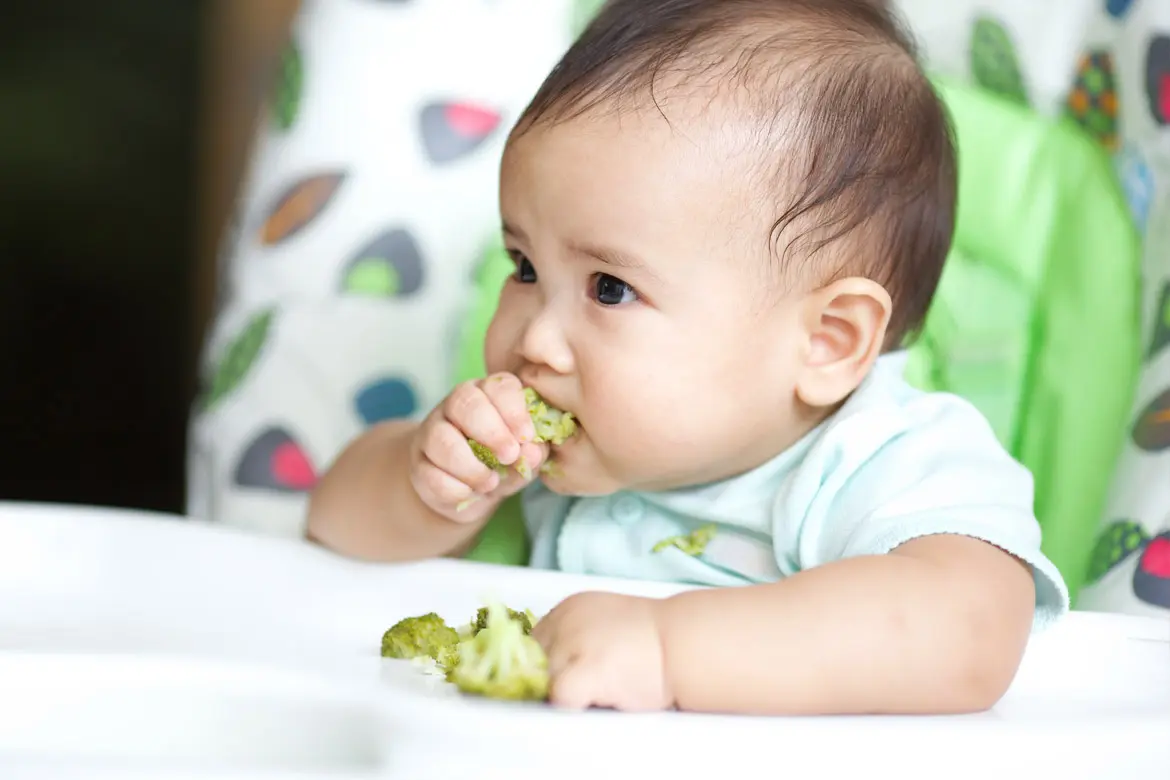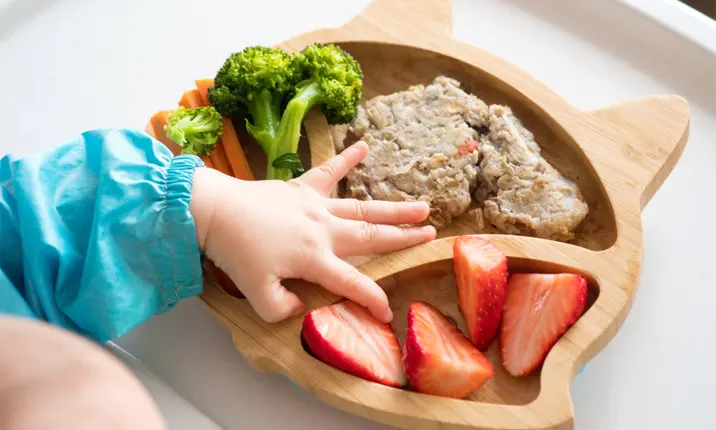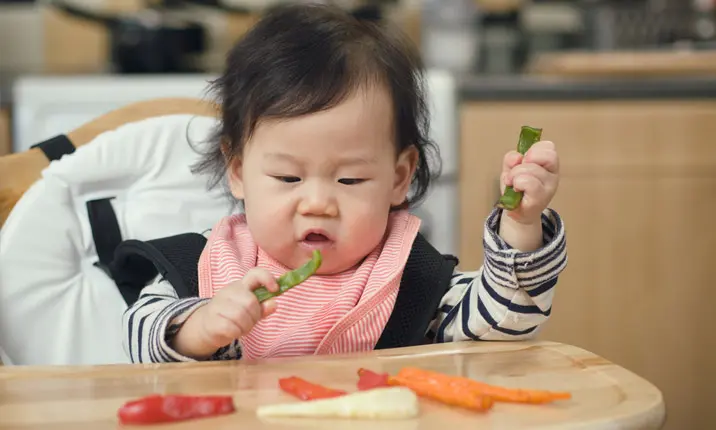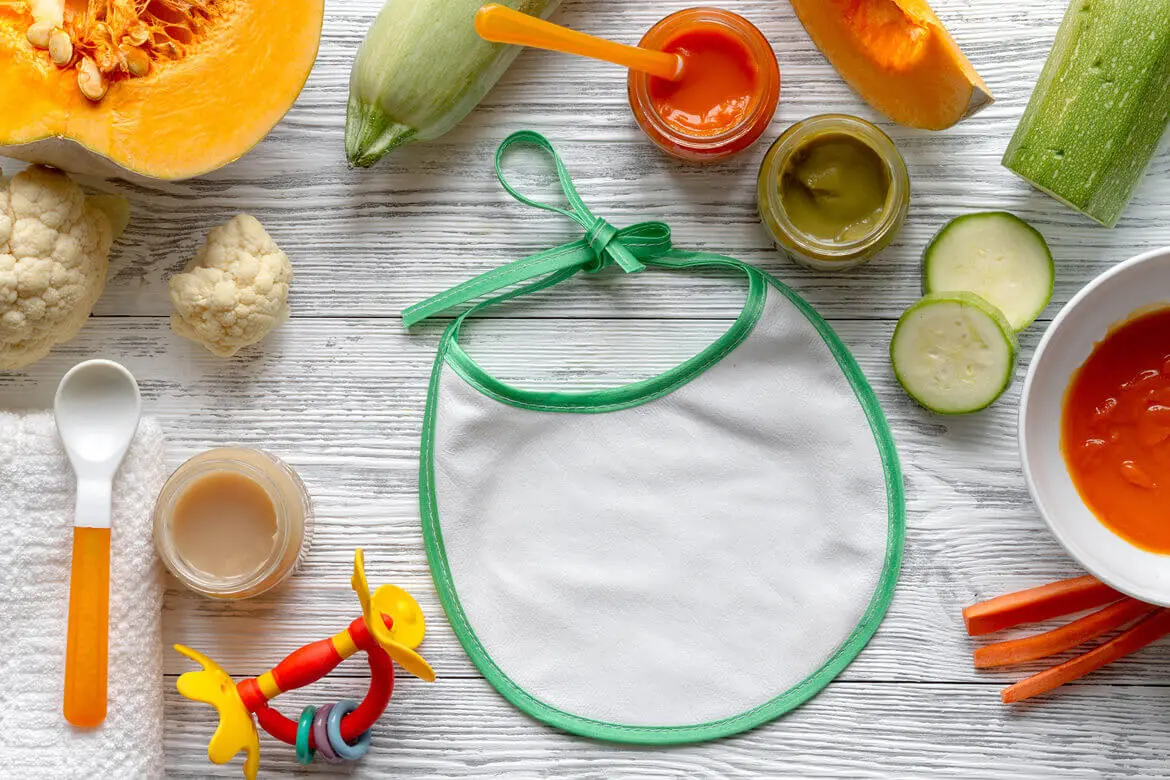What is baby-led weaning?
Increasing in popularity, baby-led weaning is an alternative way to introduce solid foods to your exclusively breast- or bottle-fed baby instead of spoon-feeding commercially produced baby foods and purées. Through this process, you offer baby-sized pieces of regular foods. It seems that the method offers a variety of benefits, ranging from setting healthier eating behaviours from the outset to better long-term health outcomes such as reducing the risk of overweight and obesity for your baby.
Baby-led weaning (BLW) means that at around 6 months, your baby can be introduced to solid foods through self-feeding. You pick what foods to offer and when to offer them. Your baby will then explore food preferences as well as how much and how quickly to eat.
What are the benefits of baby-led weaning?
By giving your baby a degree of control over how they begin to eat solid food, you are setting them up for a healthy relationship with food in addition to the following benefits:
Easier meal times
Baby-led weaning enables you to offer your baby the same kind of food you serve in your family meal, but in bite-size pieces. In addition, since you don’t have to spoon-feed your baby separately, you are free to all eat together as a family around the same family table.
Promotion of good eating behaviours
Your baby can choose what and how much to eat and this encourages the development of healthier eating patterns based on their own appetites rather than external factors.
Reduced fussiness around food
Parents often claim that baby-led weaning reduces picky eating behaviours and promotes acceptance of a wider variety of foods. This is because your baby is introduced to a wider variety of tastes, smells, and textures at an earlier stage.
You're worried your baby may choke. Does baby-led weaning increase the risk of choking?
As your baby learns to eat solid food, it is natural to fear that they may choke. At 6 months of age, not all babies have developed the oral motor skills that are required for chewing and swallowing. Therefore, there may be a discrepancy in the baby's ability to self-feed.
Steps to reduce the risk of choking
Whether it is the conventional way of introducing solids or baby-led weaning, it is important to take the following steps to minimise the chances of your baby choking:
- Avoid foods that pose choking risks such as:
- Hard, raw fruits and vegetables
- Popcorn
- Raisins
- Uncut meats
- Whole grapes
- Cut foods in lengthy shapes so your baby can grasp with ease
- Don't rush your baby to finish meals
- Ensure that the foods you offer your baby can be mashed between your fingers or between your lips with ease
- Ensure your baby sits up straight at 90 degrees during mealtimes
- Never leave your baby alone during mealtimes
How do you know if your baby is ready for solid food?
Breast milk or formula is sufficient for all your child’s nutritional needs until about 6 months of age. At this stage, you should notice an absence of tongue thrust (a baby’s natural reflex of pushing out food with their tongue). Other signs to look out for include your baby being able to:
- bring their hands to their mouth
- hold their head up
- sit up by themselves
- use their hands to scoop and hold items
What solid foods can you give?
From 6 months of age, milk alone is not sufficient to meet your growing baby’s nutritional needs. Your baby needs iron-rich foods, as iron is crucial at this stage of your baby’s growth and development. Some of the high-iron foods that you can start adding gradually day by day include:
- ground meat
- ground nuts and seeds
- iron-fortified rice cereals
- lentils
- slightly mashed beans or peas
- soft-boiled green beans
- steamed broccoli and spinach
It is also important to offer your baby a varied and balanced diet. Other foods that you can start introducing include:
- avocado
- baked, skinless potato or sweet potato
- banana
- cabbage
- finely flaked fish such as salmon
- oatmeal
- orange segments without the skins
- pumpkin
- rice
- steamed or shredded carrots
- thawed or slightly mashed berries
- tofu
- tomato
- unsweetened yogurt
Foods to avoid
There are certain foods you should avoid giving babies and young children. These include:
- Salt. Babies must not be given too much salt as it can be harmful to their immature kidneys. Do not add any salt when preparing your baby’s food and do not use stock cubes or gravy either.
- Sugar. Babies do not need sugar. Avoid sugary snacks and drinks, including honey and fruit juices.
- Saturated fat. Do not give your child too many foods that are high in saturated fats, such as chips, biscuits and cakes.
- Honey. Sometimes, honey contains bacteria that can produce toxins in a baby’s intestines, which may lead to a serious illness called infant botulism. Wait until your child is over 1 year old before giving them honey.
- Whole nuts and peanuts. Children under 5 years should not be given whole nuts and peanuts as they can choke on them. Nuts which are crushed, ground or smooth may be given after they are 6 months old.
- Some cheeses. Avoid mould-ripened soft cheeses, such as brie or camembert, ripened goat’s milk cheese and soft blue-veined cheese as they may carry bacteria. Check labels on cheeses to make sure they are made from pasteurised milk.
- Raw and lightly cooked eggs. Current evidence suggests that you can introduce eggs as one of your baby’s first food. You can give your baby eggs if both the white and yolk are solid from around 6 months. But do keep a lookout for allergic reaction or symptoms of food sensitivity.
- Raw shellfish. Raw or lightly cooked shellfish, such as mussels, clams and oysters can increase the risk of food poisoning.
- Certain fish. Fish, such as shark, swordfish and marlin have a high amount of mercury that can affect the development of a baby’s nervous system.
IMPORTANT: Currently, very little research has been done of baby-led weaning. For parents who choose to follow baby-led weaning methods, please do so with caution. The current recommendation on introducing solids is to start with smooth and lumpy food from 6 – 9 months old and then mashed, chopped and cut food from 10 – 12 months old. At 4 – 6 months you can start your baby on the weaning process depending on your baby's readiness. While there may be health benefits to baby-led weaning, it is best to speak to a dietitian if you need help with planning your baby-led weaning regime.














